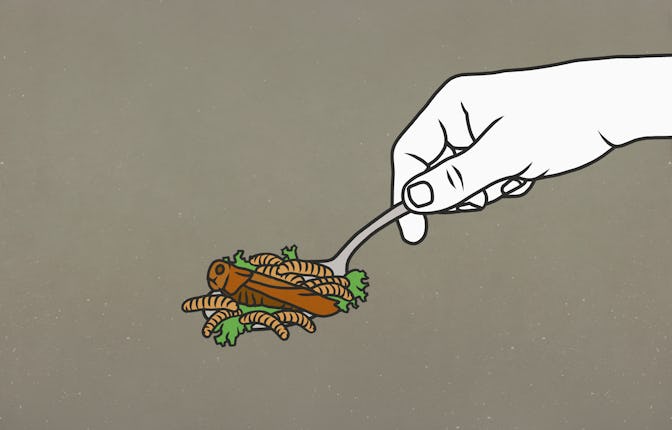Want to save the world? Eat more bugs
Scientists say integrating insects into our diets could significantly benefit the planet.

In post-apocalyptic fiction, the idea that humans will eventually resort to eating insects as a way to meet their protein requirements is a well-worn trope. Scientists have been telling us for years that eating bugs may not be a terrible idea. Insects, after all, are protein rich and plentiful and eating them is really working out for bats. If it’s hard for you to get over the ick factor, you may want to reconsider, because this new research suggests that eating bugs may help humans and the planet stay healthy.
“Many people in our part of the world need to get used to eating insects, but I can tell you that I've eaten many other insect species around the globe, and I've always had a wonderful meal on them,” said Marcel Dicke, a researcher at Wageningen University in the Netherlands and one of the authors of the paper published today in the journal Trends in Plant Science. Dicke told EurekAlert that he always knew that insects were high in protein, but during the course of his research, he learned that the benefits of using insects as food outweigh the benefits to humans.
The authors of the paper argue that the leftovers created as part of insect-for-food production can be used to produce sustainable crops. Unlike the byproducts of the livestock industry — which are famously terrible for the environment — plants and soil are able to break insect leftovers as nutrients. The researchers created a circular food system model to help explain how this works.
Because the system is circular, it has no real starting point, but for the sake of explanation imagine that it starts with insect production. When insects are produced for food, the paper explains, they leave behind two important compounds: exuviae and frass. Exuviae are the exoskeletons insects leave behind after molting, and frass (which is similar to the German word for “eating”) is basically insect poop and unconsumed food.
Exuviae and frass help beneficial microbes increase in soil which in turn leads to increased crop growth and resistance and therefore higher plant yields. Then we eat the insects and the waste we produce as a result essentially helps us farm more insects. The genius of this circular system is that it produces very little waste — every byproduct is able to be effectively reused.
It also takes very few resources to get the process started. 25 kilograms of grass can produce about 250 kilograms of edible insects. For context, the same amount of grass can only yield about one kilo of beef, EurekAlert reported. Not only that, but you can eat more of an insect than you can a cow. Apparently, only 40% of a cow is edible, but you can eat up to 90% of an insect’s body.
The only problem is people, Dicke told EurekAlert. With the exception of a few — arguably more sustainability-oriented cultures — humans don’t routinely eat bugs. But given the gourmet status of some insects dishes, who’s to say that can’t shift? There’s a growing trend of restaurants that specialize in insect cuisine, and while the TikTok trend of eating bowls of bugs is actually fake, I believe we can make this creepy crawly dream into a reality.